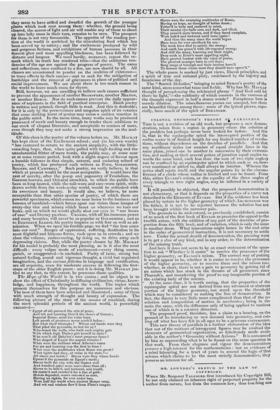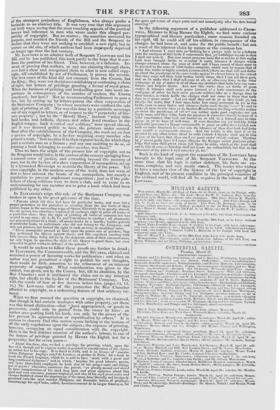MR. LOWNDES'S SKETCH OF THE LAW OF COPYRIGHT. WHEN Mr.
Sergeant TALFOURD first introduced his Copyright Bill, he not only claimed an inherent right of' perpetual property for the author from nature, but from the common law; thus toinhing one
of the strongest prejudices of Englishmen, who always prefer a heritable to an abstract title. It was very true that this argument cut both ways, seeing that the most touching appeals of the poetical lawyer had reference to men who wrote under this alleged per- petuity of copyright. But no matter ; the assertion answered its purpose, and enabled the friends of the Bill and the Sergeant to declare that they were not seeking to establish a new right, but to restore an old one, of which authors had been improperly deprived no longer ago than the last century.
Ain Lowsnes is an admirer both of Sergeant TALFOURD and his BA and he has published this book partly in the hope that it con- fines the position of his friend. This, however, is a delusion. In- stead of proving that authors, or any one claiming through them, ever had a clear and recognized claim to what is now called copy- right, till established by act of Parliament, it proves the reverse. The first cases of the kind did not emanate from the Courts, but the King; • they were not decisions establishing or confirming a claim of right, but letters of .privilege granting a favour of royal grace. When the business of printing and bookselling grew into more im- portance in consequence of the number of readers, the Crown interfered ; but how ? Not by recommending Parliament to pass a law, but by setting up by letters-patent the close corporation of the Stationers Company ; to whose members were confined the sole right of printing at all. Nor was this done by a patriotic sovereign out of any regard to letters, or of respect to the " perpetuity of lite- rary property"; but by the " Bloody Mary," because "many thlse fond books, and ballads, rhymes, and other lewd treatises in the English tongue, both hcretica/ and seditious," were spread abroad, and it was deemed politic to have the printers under control. Soon after the establishment of the Company, the trade set on foot a species of copyright, by a by-law requiring every member who printed a work, " first to enter it in their register-book, for which they paid a certain sum as a licence ; and any one omitting to do so, or printing a book belonging to another member, was fined."
Thus we have the origin of the present law of copyright, not as the Sergeant would infer, in the custom of the country springing from a natural sense of justice, and extending beyond the memory of nian, but in the be-law of a close corporation of monopolists, set up by a tyrannical Sovereign to restrain the liberty of the press. Yet even copyright, in the modern sense of the word, does not seem at first to have entered the heads of the monopolists, but merely a regulation to prevent unpleasant competition ; just as if the pub- lishers of cheap editions were to fbrm a club, and to come to an understanding for one member not to print a book which had been published by any other.
In Euzansan's reign this rule of the Stationers Company was broken in upon by the great grievance of the time.
" Patents which till then haul been for particular books, and were but a proper protection to the patentees in securing them the due fruits of their labour, began in the succeeding rein of Queen Elizabethto be greatly abused. On one person leas sometimes conferred an exclusive right to print all books of a particular class : thus the right of printing all books of common law was secured to one man ; all A, B, Cs and Catechisms to another ; all ahminacks and prognostications to a third ; all music-books to a fourth ; besides patents of particular books to individuals who did not belong to the Company, and were not printers, but farmed the right to such as were, at exorbitant sums.
" These monopolies pressed so hard upon the poorer sort of printers, that they petitioned the Queen against them ; and this expedient meeting with little success, they, being driven by the desperate state of their circumstances, not only began to question the right of the Queen to grant them, but even proceeded to print works in defiance of the patents."
It would be useless to follow these proofs any further in detail ; for ELIZABETH, the Commonwealth, and the STUARTS, claimed and exercised a power of licensing works for publication ; and when an author was not permitted a right to publish his own thoughts, there would be little attention to the refinement of an inherent perpetuity of copyright. What consideration was given to the subject, was given, not by the Courts, but, till its abolition, by the Star Chamber ; and it attributed the claim not to any inherent right, but chiefly to the by-law of the Stationers' Company. Yet, with the words of four or five decrees before him, (pages 14, 15, 16.) Mr. LowNnEs talks of the protection the Star Chamber afforded to copyright, as a redeeming feature of that arbitrary tri- bunal.
When we first mooted the question of copyright, we observed, that though it had certain analogies With other property, yet there was this broad distinction—that Vend appropriated, or goods in possession, could only be gotten front the owner by force : an author once putting forth his book, can only by the power of the law prevent its appropriation or republication by others." It is curious to observe that this notion seems lurking at. the bottom of all the early regulations upon the subject ; the expense of printing, however, occupying an equal consideration with the copyright. Here is the first distinct mention of the author's labour, in one of the letters of privilege granted by HENRY the Eighth not for a perpetuity, but for seven years- " About this time, also, we find a privilege for printing, which, upon the face of it, though not in express words, is .granted in consideration of the claims an author has to his copy. It is dated in -1530, and is in favour of maistre Jehun Pal ,,saraue Angloys natyf de Londres, et gradue de Paris,' for a book to teach the French language, which be is said to have made with a great and long-continued ityligenee:' and in which, ' besydes his great labours, payns, and tyme thereabout employed, he hath also at his proper coste and charge put in print; wherefore, continues the patent, we greatly muted and stered by dewe consyderation of his sayd long tyme and great dyligenee about this good and very necessary purpose employed, and also of his sayd great costes and charges bestowed about the imprintyng of the same, ham liberally and benigncly graunted vnto the sayd moister Palsgraue our fauorable letters of priuilege, concernynge his sayd boke, called, Lesclarcissenrent de la lauigue fraucoyse, for the space and tame of scuyn yeres next and immedyatly after the date hereof enswyng.' " In the following argument of a publisher addressed to Cam- WELL, Minister to King HENRY the Eighth, we find some curious typographical and literary particulars ; some reasons founded on his right, till he could sell off his edition, in consequence of the charges he had been at, and some for the public benefit ; but not a word of his inherent claim by nature or the common law. " And whereas I wryt vnto yor lordship for a preuye scale to be a defence vnto the enemycs of this byble 1 vnderstondc that yor lordshipes mynde is that I shall not nede it. But now moost gracyous lorde ffor as moche as this worke Lath bene brought forthe to Or moost & costly laboures & charges which charges amount aboue the some of £500 and 1 bane caused of these same to be punted to the some of 1500 bookes complete, which now by reason that of many this worke is highly comded, (commended,) there are that will and dothe go about the pryntynge of the same worke agaync in a lesser letter, to the entent that they mayc sell their lytle bookes better chop° then I can sell these great' and so to make that I shall sell none at ulna or cues very fewe, to the vtter vndoynge of me yr orator & of all those my creditors that bath bene my com. fortors and helpers thesis,. And now this worke thus set forthe wt great stodye & laboures shall sods psons (moued NO a lytle couetousnes to the vinloynge of other for their awne pulsate welthc) take as a thyuge done to their halides, in which baltic the charges shall not come to them that hats done to yr poore orator. And yet shall they not do yt as they fynde yt, but falsefye the texte, that I dare saye, looke how many sentences as are in the byble, cuen so many fautes and crroures shalbe made therin."---e YL and to make yt more trewer then yt is, therforeDruchemen dwelling w'in this realme go about the pryutynge of ytt wet' can nether speke good englyshe, ner yet wryte Done, and they wilhe both the prynters & correctws theruf; because of lytel couetousnes that wyll not bestow xx or AZ to a learned man to take payee in yt to bane yt well done. It were therefore (as yor lordship dothe euydently perceaue) a Ihynye rnreasonable to mit or safer them (which now Imth no soche busynes) to cuter into the laboures of them that ladle had bathe sore tranth• enreasonable charges. And the truth° is this that if yt be prynted by any other before these be solde (which I thynke shall not be this to yore at the least, that then am I yor poore orator utterly vndone. Therfore by yr moost godly tumor if 1 mays obtayne the Kynges moost gracyous priui- ledge that none shall print them tyll these be solde, which at the least shall not be this iii yore, yr lordship shall not fvnde me vntbankfull, but that to the
vttermost of my power 1 consyder yt, &c."
Such is the kind of support the researches of Mr. LowxuEs have brought to the legal case of Mr. Sergeant TALFOURD. At the same time that his logic is rather deficient, his facts are cu- rious, complete, and very neatly stated. The reader who wishes to have a succinct view of the history of the law of copyright in England, and of its present condition in the principal countries of the civilized world, will find all he requires in the volume of Mn
Lowxtes.



























 Previous page
Previous page